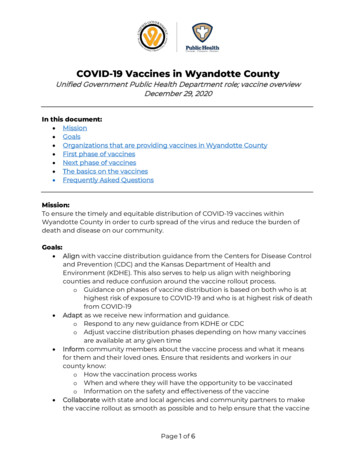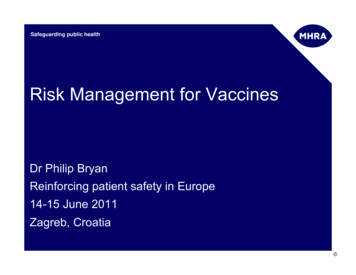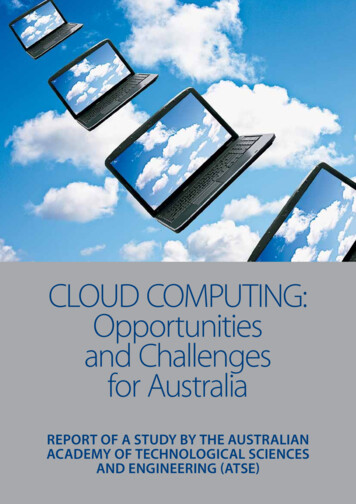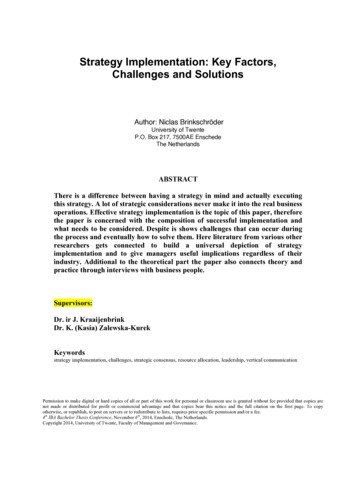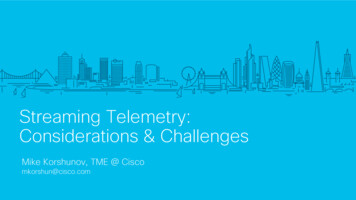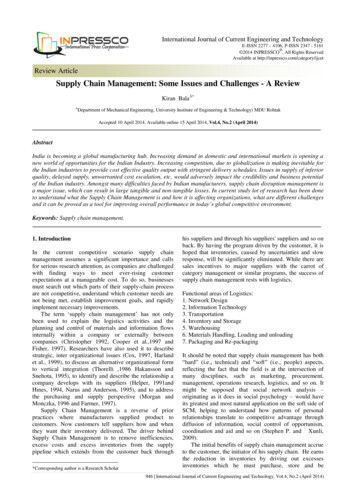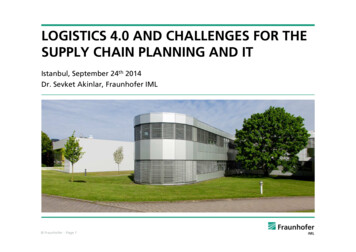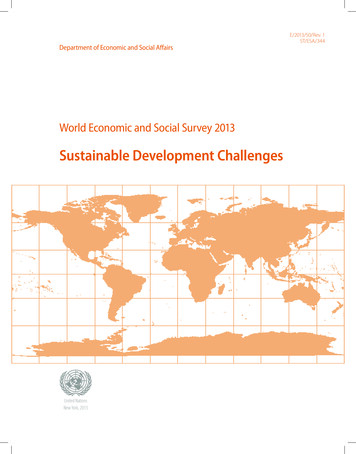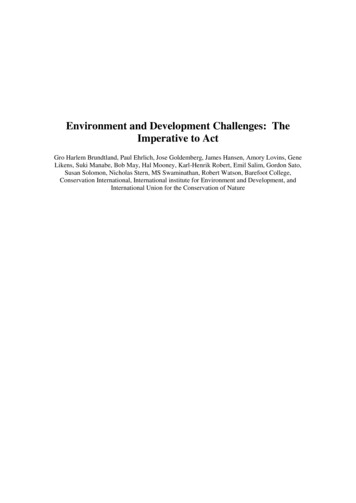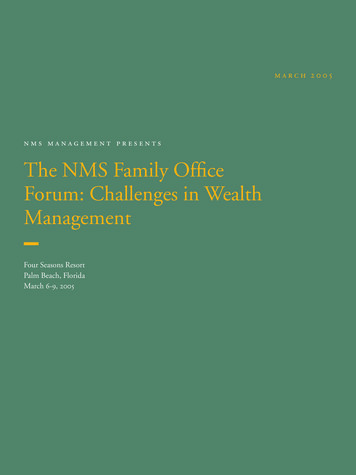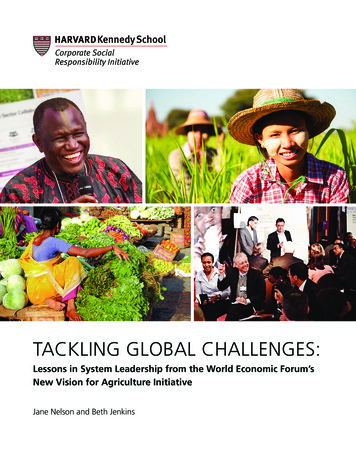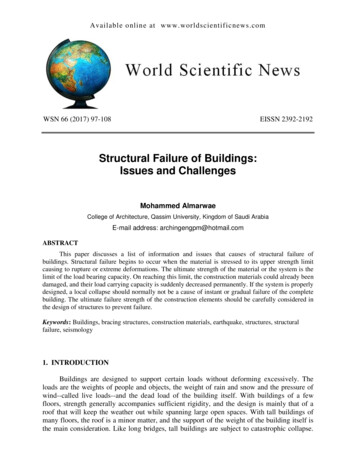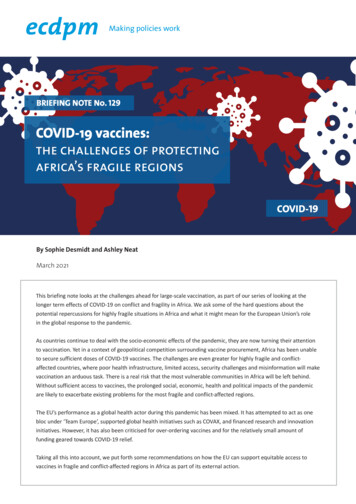
Transcription
Making policies workBRIEFING NOTE No. 129COVID-19 vaccines:the challenges of protectingafrica’s fragile regionsCOVID-19By Sophie Desmidt and Ashley NeatMarch 2021This briefing note looks at the challenges ahead for large-scale vaccination, as part of our series of looking at thelonger term effects of COVID-19 on conflict and fragility in Africa. We ask some of the hard questions about thepotential repercussions for highly fragile situations in Africa and what it might mean for the European Union’s rolein the global response to the pandemic.As countries continue to deal with the socio-economic effects of the pandemic, they are now turning their attentionto vaccination. Yet in a context of geopolitical competition surrounding vaccine procurement, Africa has been unableto secure sufficient doses of COVID-19 vaccines. The challenges are even greater for highly fragile and conflictaffected countries, where poor health infrastructure, limited access, security challenges and misinformation will makevaccination an arduous task. There is a real risk that the most vulnerable communities in Africa will be left behind.Without sufficient access to vaccines, the prolonged social, economic, health and political impacts of the pandemicare likely to exacerbate existing problems for the most fragile and conflict-affected regions.The EU’s performance as a global health actor during this pandemic has been mixed. It has attempted to act as onebloc under ‘Team Europe’, supported global health initiatives such as COVAX, and financed research and innovationinitiatives. However, it has also been criticised for over-ordering vaccines and for the relatively small amount offunding geared towards COVID-19 relief.Taking all this into account, we put forth some recommendations on how the EU can support equitable access tovaccines in fragile and conflict-affected regions in Africa as part of its external action.
COVID-19 and vaccinations inAfrica: the status quo 1The COVAX Facility aims to distribute 2 billion COVID19 doses globally by the end of 2021 (McSweeney andChingono 2021). For Africa, the COVAX Facility aims toprovide 600 million doses to the continent by the endof 2021 (WHO 2021). This, combined with dosesordered by the African Union, brings the totalnumber of reserved doses for Africa so far to 1.27billion. 2 Africa requires approximately 1.5 billiondoses to immunise 60% of inhabitants, the thresholdfor herd immunity.To provide Africa with the number of COVID-19vaccines necessary for its populations, and to ensurethat these are able to reach all parts of society,including the most vulnerable, a number ofinternational initiatives have been set up to supportvaccine supply in Africa (see Box 1 below).Box 1: African and international initiatives in support of vaccine supply and developmentAfrican Union COVID-19 vaccination initiatives: July 2020: Africa Centres for Disease Control and Prevention (CDC) launches the Consortium for COVID-19 VaccineClinical Trial (CONCVACT), in an effort to secure some 10 late stage vaccine clinical trials as early as possible on thecontinent (Africa CDC 2020a). August 2020: Africa CDC launches COVID-19 Vaccine Development and Access Strategy. This strategy has threemajor strategies for vaccination across Africa: 1. To accelerate African involvement in clinical development, 2.Ensure Africa’s access to sufficient vaccine supply and 3. Remove barriers to wide-spread delivery and uptake of thevaccine across Africa (Africa CDC 2020b). August 2020: African Vaccine Acquisition Task Team (AVATT) endorsed by the AU, composed of a number of highlevel African Union officials and special envoys. 3 At the time of writing, AVATT has so far reserved 672 millionCOVID-19 vaccination doses for Africa (BBC News 2021a).International COVID-19 vaccination initiatives in Africa: April 2020: World Health Organisation (WHO) established the Access to COVID-19 Tools (ACT) Accelerator, a globalcollaboration to coordinate production of and boost access to treatments, vaccines and tests. The COVID-19 VaccinesGlobal Access (COVAX) Facility, coordinated by Gavi (the Vaccine Alliance), the Coalition for Epidemic PreparednessInnovations (CEPI), and the WHO, is the ACT Accelerator’s vaccine branch. June 2020: Gavi launches the Gavi Advanced Market Commitment for COVID-19 Vaccines (Gavi COVAX AMC), as afinancing instrument that represents the first building block of COVAX (Usdin 2020). February 2021: G7 leaders pledge to increase their contribution to the COVAX initiative, raising their overallcommitment to 7.5bn (BBC News 2021b). February 2021: UN Security Council unanimously passed a resolution for the fair worldwide distribution of COVID-19vaccines, intended to improve access to vaccines in fragile countries and encouraging wealthier nations to donatevaccine doses to countries (UN 2021).Testing and production of vaccines in Africa: Human vaccine trials were held in several African countries, including South Africa and Egypt. In South Africa, clinicaltrials were held for two vaccines, Novavax vaccine and the Oxford ChAdOx1-S vaccine (Makoni 2020 and Kagina 2020). Vaccines production capacity exists in Senegal, Egypt, Morocco, Tunisia, Ethiopia and South Africa (see Veron and DiCommo 2020). Three countries in Africa are planning to manufacture international COVID-19 vaccines so far – Morocco (the Chinesevaccine), Egypt (Russian vaccine), and South Africa (US Johnson & Johnson vaccine) (Development Reimagined2021b).1
livelihoods in the world’s most poorest countries.” 4These initiatives are a good starting point, but byfar nowhere near the necessary action requiredto effectively vaccinate Africa’s populations. TheACT Accelerator and its COVAX facility, for example,remain severely underfunded (Ravelo 2021).This has provoked the recent public outcry byTedros Adhanom Ghebreyesus, Director-General forthe World Health Organization, warning that “theworld is on the brink of a catastrophic failure, andthe price of this failure will be paid with the lives andCOVID-19-related deaths in Africa have jumped by40% in a month, the World Health Organizationwarned on 11 February 2021, as countries grapplewith new variants of the virus and health systemsbecome overstretched (The New Humanitarian 2021).New studies have raised fears, however, that thespread and occurrence of COVID-19 in Africacontinued to be underreported in official figures.Figure 1: Inequity in global COVID-19 vaccine orders (as of 1 March 2021)2
any COVID-19 vaccine orders (DevelopmentReimagined 2021b).Many countries, including fragile and conflict-affectedregions, are unable to afford mass testing and lackcapacity to collect reliable data on cases and deaths,especially in remote areas. This fuels the risk that thecontinent may not be seen as a priority for scarceglobal vaccine supplies despite the urgent need (TheGuardian 2021). Eswatini, Malawi, and Mozambiquefor example are all struggling with a new COVID-19strain, but are yet to receive a single vaccine dose (TheNew Humanitarian 2021).This comes at a time of widespread “vaccinenationalism” in which wealthier nations have orderedvast quantities of vaccines from developers andmanufacturers, causing global disparity in access toCOVID-19 vaccines. As of mid-February, three-quartersof all global COVID-19 vaccine doses were in only 10countries, and more than 94% of countries beginningvaccinations were high-income or upper-middleincome (The New Humanitarian 2021). According toTable 1, Canada, the UK, the EU, Australia, and theUSA have all ordered enough vaccines to cover theirrespective populations at least two times over. In arecent report, the International Chamber ofCommerce stressed the economic toll that unequalvaccine distribution could have, with the worldeconomy potentially losing up to 9.2 trillion in 2021 ifpopulations in developing countries are largelyexcluded from vaccination programmes, and withnearly half these costs borne by wealthy countries(Cakmakli et al 2021).At the time of writing, the AVATT has so farordered 672 million COVID-19 vaccination dosesfor Africa (BBC News 2021c). As demonstrated inFigure 1 on page 2, this amounts to vaccinationcoverage of just 38% of the continent’s population.According to a press release from the AVATT though,less than 20% of the initial 270 million doses firstordered by the AU will be available before June 2021(Swalis and McSweeney 2021). COVAX forecasts that itwill also have supplied 640 million doses globally bythat time, about 30% of which are for AU countries.This amounts to approximately 246 million dosessupplied to Africa by both the AVATT and COVAXcombined before June 2021, a far cry from the 1.5billion doses needed for the continent. Bycomparison, the EU expects member states tovaccinate 70% of their adult populations by thesummer (McSweeney and Chingono 2021).At the same time, Western powers have committed tosupport fair and affordable COVID-19 vaccination on aglobal scale, which needs to be seen against thebackdrop of an international competition to win overthe hearts and minds of decision-makers andpopulations in Africa and developing countries. So far,as highlighted in Box 2 on page 4, the EU has notplayed a particularly prominent role here, and the UShas only recently announced its return to the WHO,leaving space for other global actors to step in as morereliable partners.Poorer countries are also being encouraged to secureadditional coverage through their own bilateral deals,but the number of vaccine doses that have beensecured are unevenly distributed across Africancountries. 5 Twenty-five African countries do not have3
Box 2: Geopolitical implications of vaccine governanceThe EU mobilised 38.5 billion for the immediate health emergency and socio-economic impacts of the pandemic(Bayer 2021). Yet, it has also ordered enough doses to vaccinate its populations 2.7 times over which has affected thesupply for Africa in the short term, and has done damage to its reputation according to Save the Children Europe’sdirector Anita Bay Bundegaard (Bayer 2021). The US, under the Biden administration, has recently announced itsreturned commitment to the WHO and its intention to join the COVAX programme (Mancini 2021). Damage done bythe Trump administration to the reputation of the US as a reliable global health provider will not be forgotten quickly,however. Overall, in the eyes of many countries, Western states have selfishly hoarded vaccines at the expense ofdeveloping countries (Hinane El Kadi and Zinser 2021).China, and to a lesser extent Russia, have presented themselves as alternative, more reliable, and more affordablevaccine suppliers to Africa (Campbell 2021), while having at the same time an immense need to cater for their ownpopulation which will also not go unnoticed in Africa. So far, China is emerging as a leading COVID-19 vaccine distributorin developing countries, asserting that its distribution networks in Africa are well established, and that its vaccine can betransported cheaply in off-grid refrigeration units. The Seychelles, Morocco, Egypt, and Zimbabwe have already startedtheir vaccination campaigns with a number of doses supplied by SinoPharm (Mwai 2021). Morocco has also signed aconvention to manufacture SinoPharm’s vaccine and distribute it to other African countries on behalf of the Chinesepharmaceutical group (Hinane El Kadi and Zinser 2021).However, Chinese pharmaceutical companies have not yet published all of their vaccine test results, and there areconcerns about vaccine effectiveness (Fox 2021). If SinoPharm’s vaccine restores a sense of normality to life acrossAfrica, China will be praised and Sino-Africa relations could emerge much stronger from the crisis. But if the vaccineproves ineffective or creates unforeseen health effects, China’s carefully crafted attempts to frame itself as the solutionto - rather than the cause of - the pandemic, as well as a responsible power in the global South, could be undermined(Campbell 2021).The challenges of carrying out COVID-19vaccinations in fragile and conflictaffected countriesexperience to overcome challenges in theemergency delivery of vaccines in difficult andcomplex environments.Logistical challengesThe prospect of large-scale COVID-19 vaccinationcampaigns sets unprecedented challenges globally.But this will be the case even more so in fragile andconflict-affected regions. Once enough doses ofCOVID-19 vaccines have been secured for Africa’spopulations, the continent will have to distributevaccines alongside logistical challenges, limitedhealth infrastructure, and restricted access tocommunities in regions affected by conflict. There,the situation is further compounded by the spreadof misinformation and disinformation surroundingCOVID-19 vaccines. Yet, previous vaccinationcampaigns have given African countries valuableOnly three countries in Africa are planning tomanufacture international COVID-19 vaccines so far– Morocco (the Chinese vaccine), Egypt (Russianvaccine), and South Africa (US Johnson & Johnsonvaccine) (Development Reimagined 2021b). But thequestion remains whether enough can bemanufactured to meet demand (DevelopmentReimagined 2021b), and given the existing lowcapacity for vaccine production in Africa, mostvaccines will probably need to be imported. Severalof the current vaccines such as Pfizer-BioNTech andModerna require ultracold storage, making it4
Restricted access to communitiesdifficult to distribute them in several parts of Africawith considerable logistical, transport, andinfrastructure challenges (Chatham House 2020).The Africa Centres for Disease Control andPrevention recently outlined an urban-centredstrategy to allow African nations to roll out vaccinesthat require ultracold temperature storage.In conflict-affected regions the central state haslimited territorial control in certain areas. Access tovulnerable communities in these areas could beseverely restricted. Other communities that are hardto reach include minorities, refugees and displacedpeople. In addition, there are communities that arede facto beyond the reach of the state and theinternational communities. How to deal with thesecommunities will present a politically sensitive issueto take into in the design of vaccination campaigns.Despite having limited resources compared to otherregions, African countries have demonstrated a widerange of innovation and strategies in previousvaccination campaigns to establish effective logisticchannels, such as the use of solar-powered coldchain fridges and mobile vaccine delivery points forsites with limited electricity (Edward-Ekpu 2021).Some companies plan to use alternative methods todistribute vaccines at their required temperaturesand quantities, for example via drone delivery tohard-to-reach places in Rwanda, Ghana, and Nigeria(Cheney 2021). Notwithstanding technical andlogistical innovations, highly fragile environmentswill face immense planning and monitoringchallenges to control and manage the magnitude ofthe COVID-19 vaccination campaign.Ceasefires have been proposed, including by the UNto ensure access to hard to reach communities.Without such local ceasefires, the need for travelpermissions from non-state armed groups as well asensuring the safety of health personnel couldcomplicate and hamper vaccine distribution (ICRC2020). But local vaccine ceasefires will need to becontext-specific by design. In places where a peaceprocess or dialogue is already underway, these willbe easier to develop. A global ceasefire may spurdiscussions on a new (local) ceasefire, but this isno guarantee.Limited health infrastructure and institutionalbottlenecksGaining (temporary) access to these regions andcarrying out immunisation activities will beproblematic, although not impossible as previousexperience shows. 6 In 2019, despite ongoing armedconflicts, healthcare workers were able tosuccessfully introduce the Ebola vaccine to remotecommunities in North Kivu (Edward-Ekpu 2021).Some non-state armed groups have alreadyannounced their preparedness to cooperate withpublic authorities in the response to COVID-19, suchas the Taliban in Afghanistan and Al-Shabaab inSomalia, in principle making the delivery ofvaccinations easier and safer. Yet, fighting continuesto undermine vaccine access in both countries(Felbab-Brown 2020).In fragile and conflict settings, health facilities sufferfrom a lack of health personnel and are often undercapacitated due to the destruction, underfinancingand/or the overburdening of health services. Healthinfrastructures will undoubtedly struggle to providethe services necessary for successfully planning andadministering such large COVID-19 vaccinationcampaigns next to their regular tasks. Due to limitedconnectivity infrastructure, being flexible with theadministering of the second vaccine dose whererequired for certain vaccines will also be importantin these settings. With more attention going toCOVID-19 vaccination campaigns, the ability torespond to other health problems of the populationand to give equal attention to other vaccinations,such as against polio, will suffer. Overall, the healthinfrastructure in these countries poses very bigchallenges. Further, legal challenges may arise givenrestrictions with regards to exchanges and contactwith, and the provision of material support that isdeemed as benefiting, non-state armed groups.Combating misinformation and disinformationMisinformation and disinformation about COVID-19could undermine vaccination campaigns and publichealth services in Africa, leading to less compliancewith preventative measures and/or willingness totake a vaccine, and increased pandemic-relatedstigma fuelled by rumours (Search for Common5
provision and pandemic responses. This can deepenmistrust in public health services, thereby creating adangerous operational environment for healthcareworkers, 7 hindering access to vaccinate vulnerablecommunities, and undermining the COVID-19vaccine acceptance needed to reach herd immunity(Search for Common Ground 2021). In conflictaffected or contested areas, trust is a centralelement in the dissemination of information. Inthese areas, communities may trustlocal and traditional community leaders more thanthe government, or the international community.Ground 2021). African scientists and experts haveexpressed their worry about growing levels ofresistance and misinformation around testing andvaccination on the continent (Anna 2020). Forexample, clinical trials in South Africa, one of thehardest-hit African countries, have faced oppositionfrom protesters. For fragile and conflict-affectedstates, false information can spread quickly and takelonger to be corrected as scientific information iseven more limited (Chatham House 2020). Thesituation can be aggravated in areas with low(digital) literacy rates. Women across conflictaffected societies also face greater inequities inaccess to legitimate information and services (Searchfor Common Ground 2021).Despite the numerous challenges discussed in thissection, organisations such as the WHO, UNICEF,the Red Cross, and many humanitarian organisationshave a range of experiences and lessons learnt torely on that can help to promote and implementvaccination campaigns in fragile and conflictaffected areas in Africa. In particular, as highlightedin Box 3 below, three key factors are consideredhigh on the list of those which should beharnessed to make vaccination successful incomplex environments.A study on the Ebola crisis in West Africa showedthat misinformation, especially shared via Twitter,led to serious consequences, including thevictimisation of people and deaths (Oyeyemi et al.2014). Misinformation also risks compounding agrowing lack of trust between citizens andgovernment authorities due to poor serviceBox 3: Determinants of success for effective vaccination campaigns in AfricaLocally embedded information campaigns: In particular with regards to polio, the
Mar 01, 2021 · to secure sufficient doses of COVID-19 vaccines. The challenges are even greater for highly fragile and conflict-affected countries, where poor health infrastructure, limited access, security challenges and misinformation will make vaccination an arduous task. There is a real risk that the m
